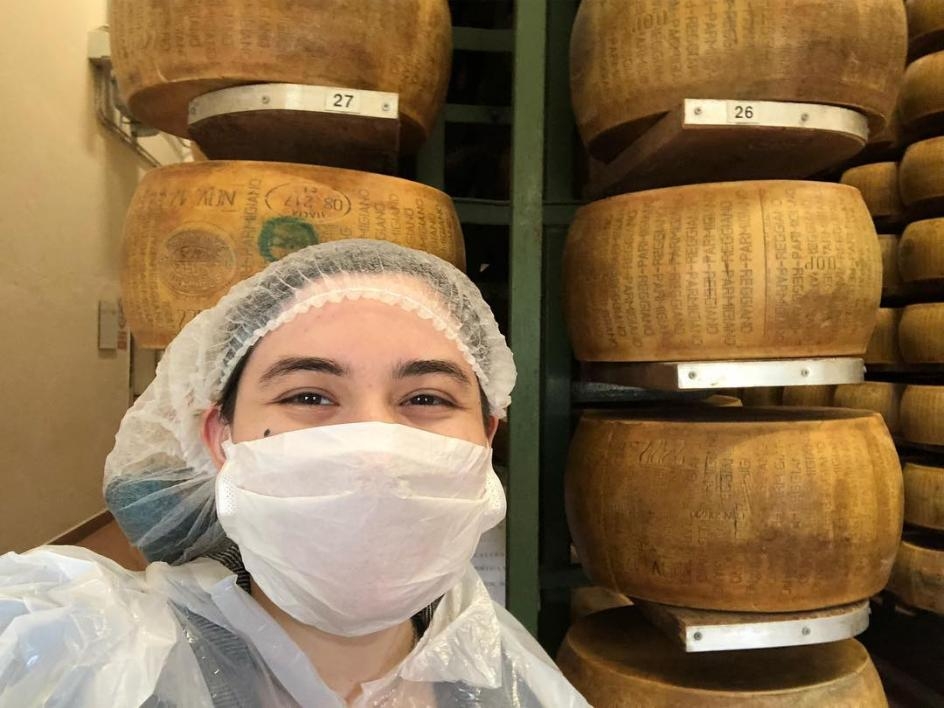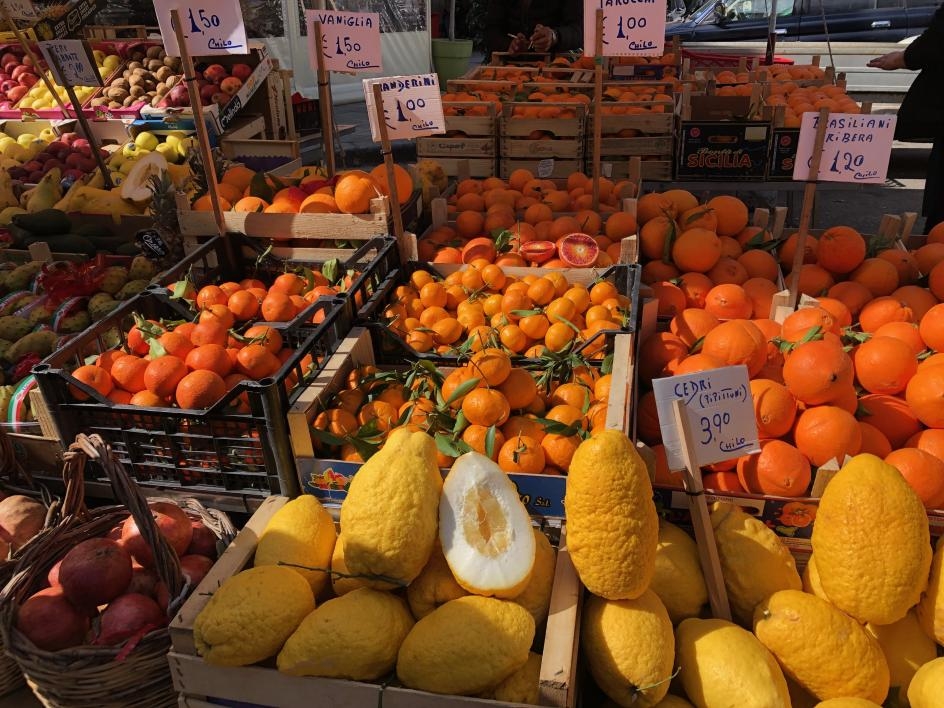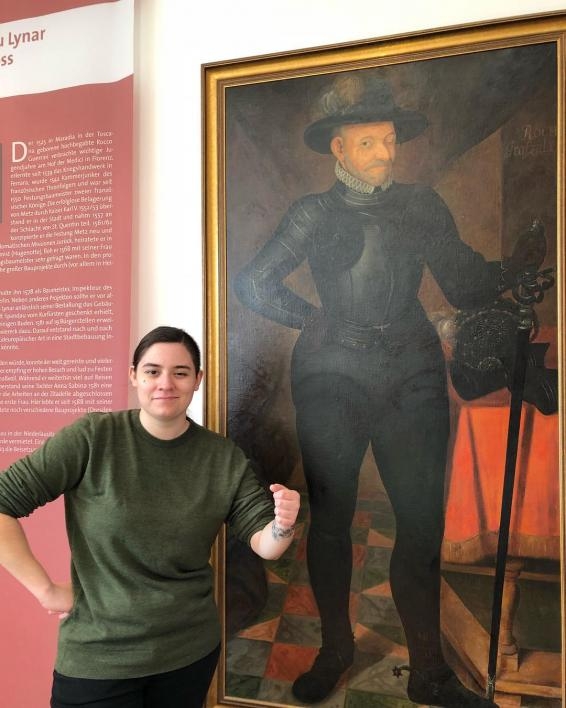Mangiamo! ASU grad blends study and sustenance

Graduating ASU student Erin Bottino has spent spring semester 2019 studying food systems in Italy. Here, she poses on Capri.
Editor’s note: This is part of a series of profiles for spring 2019 commencement.
What’s most remarkable about graduating English major Erin Bottino is her matter-of-factness. Whether she’s producing a white paper on social media in Tempe, eating currywurst and döner in Berlin, or cracking an egg (or a joke) in Umbria, she’s doing it with aplomb. She’s so laid back that even when standing straight, she’s practically leaning like the tower in Pisa.
Bottino’s relaxed approach to life belies her zest for it; she’s quite gutsy and cosmopolitan. She’s won awards for her academic work, including Arizona State University’s Friends of English Scholarship. And she’s managed to combine two very different areas of study — a BA in writing, rhetorics and literacies in the Department of English and a food system sustainability certificate in the School of Sustainability — into one, logical focus: food literacy.
Toward that end, Bottino has spent the last two semesters studying abroad: first in Berlin during fall 2018, where she “brushed up” on her German language skills.
“I studied German all through high school but didn't formally study it at ASU,” Bottino explained. “I did the CIEE Open Campus program and had an incredible time; Berlin is one of my favorite places in the world and certainly one of the most vibrant cities I've ever visited.”
This spring, she’s been in Perugia, Italy, where she’s endeavored to learn the secrets of Mediterranean gastronomy. The best way to do this? Eating and traveling of course! Bottino did it as part of the Umbra Institute’s Food Studies and Sustainability Program.
“We've been going on a number of excursions around Italy, to learn firsthand about artisanal and traditional food production practices and how modern farmers or manufacturers are keeping the traditions alive," she said. "Our big trip was to the Emilia-Romagna region, where we stopped in Parma to learn about Parmigiano-Reggiano and Parma ham/prosciutto, in Modena for balsamic vinegar and in Bologna to visit FICO World Eataly.
“I've also been down to Palermo in Sicily where I got to walk through the Capo market and to San Feliciano, a small village on Lake Trasimeno, to talk to and practice traditional net fishing with the fishing cooperative there.”
Mouths watering, we caught up with Bottino in the Central European Summer time zone to ask a few more questions about what’s next.
Question: What was your “aha” moment, when you realized you wanted to study in your field?
Answer: I'd known I wanted to study English since my senior year of high school, because it's always been one of my strongest subjects, but even when I came to freshman orientation I was still on the fence about whether or not I'd made the right choice of program. I loved English but I also wanted to be in a distinctive or unique program, and neither literature nor linguistics felt quite right to me. I remember sitting down with one of the academic advisers (it may have even been Linda Sullivan) to sign up for classes, hearing her pitch for the writing, rhetorics and literacies program, and immediately thinking, "That's it! I want to do that."
Q: What’s something you learned while at ASU — in the classroom or otherwise — that surprised you, that changed your perspective?
A: The biggest lesson that changed my perspective was that it is both OK and completely normal to change your mind about what you want to do and who you want to be! While I never changed my major, it took me two and a half years to settle on the food studies certificate, and I had already seriously considered minors in German and religious studies, as well as the LGBT studies certificate.
In the end, I landed where I did because I'd already taken most of the required courses as electives and realized that food studies was of significant interest to me. This lesson doesn't just apply to academics, though: Cut your hair, go to concerts at Gammage, eat at a restaurant you've never been to before. There were so many things I didn't think I'd like until I tried them while a student here, and without these experiences I wouldn't be the adult I am now.
Q: Why did you choose ASU?
A: For me, a huge draw was being accepted into Barrett, The Honors College. It allowed me to take on some exciting challenges and opened up new doors in terms of research and opportunities available to me. I also loved that it was a big school far away from my home state of Illinois because it was a completely new environment and I knew I would never get bored.
Q: Which professor taught you the most important lesson while at ASU?
A: While I have had a number of extraordinary professors, the most important lesson I've learned came from (former Barrett faculty) Charity McAdams, from whom I took both semesters of The Human Event my freshman year: Keep pushing forward. Especially in that first year, there were times when I felt pretty discouraged and stressed, but she reminded me that even slow progress means I'm moving forward.
Q: What’s the best piece of advice you’d give to those still in school?
A: To carry on professor McAdams' teachings: 'Don't give up!' That said, there's no shame in taking a step back when you need to or phoning a friend to get a new perspective on that project or paper. One of the benefits of a big school like ASU is that there are tens of thousands of people trying to make it work too, and one of them will always be around to lend a hand if you need it.
Q: What was your favorite spot on campus, whether for studying, meeting friends or just thinking about life?
A: One of my favorite places to hang out was the little courtyard outside of Gammage; especially in the evening, it's a great spot to take some Starbucks and just relax. My other favorite spot was the Open Air Market at the Phoenix Public Market. While it's technically just off the downtown campus, taking the shuttle downtown and spending a few hours at the farmers market each week did wonders for my stress levels and mental health.
Q: What are your plans after graduation?
A: After graduation, I plan to make my way back towards the Midwest and find a job in social media management. In the next few years, I also hope to return to school for a master's degree in rhetoric and eventually work in food policy at the local and state levels.
Q: If someone gave you $40 million to solve one problem on our planet, what would you tackle?
A: I would use that money to push for stronger environmental protection legislation, as to me climate change — and its impacts on all aspects of human life — is the biggest problem facing our planet.
More Health and medicine

The science of sibling dynamics: Why we fight, how we relate and why it matters
We have Mother’s Day, Father’s Day and even Grandparents’ Day. But siblings? Usually they get a hand-me-down sweatshirt and, with…

New study seeks to combat national kidney shortage, improve availability for organ transplants
Chronic kidney disease affects one in seven adults in the United States. For two in 1,000 Americans, this disease will…

New initiative aims to make nursing degrees more accessible
Isabella Koklys is graduating in December, so she won’t be one of the students using the Edson College of Nursing and Health…




